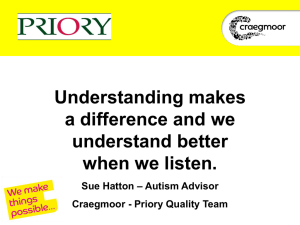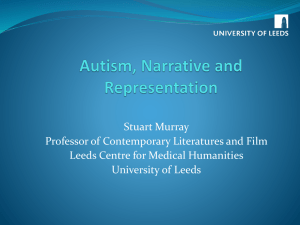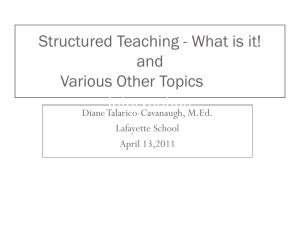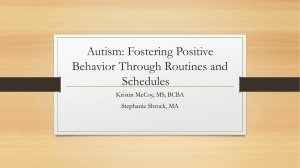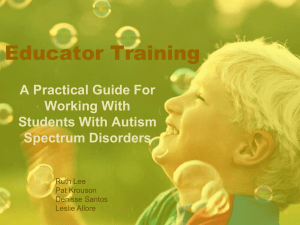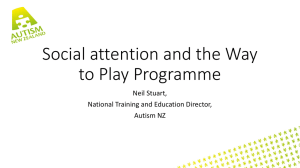Pam Lawrence - North East Autism Consortium
advertisement
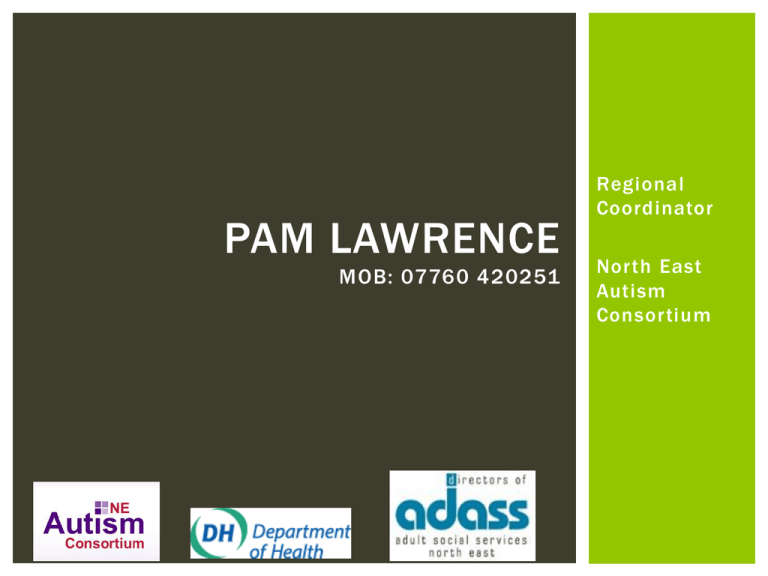
PAM LAWRENCE MOB: 07760 420251 Regional Coordinator North East Autism Consortium THE STATUTORY GUIDANCE FOR AUTISM AND HOW TO IMPROVE IT HISTORY 2009: The Autism Act 1. Our government had to produce a national strategy for adults with autism. This was done. 2010: Fulfilling and Rewarding Lives 2014: Think Autism is the recent review of the original strategy and it is intended to close the gap between that strategy and work on the ground locally. It does talk about some significant developments…. 2010: The statutory guidance 2. Our government had to produce statutory guidance for local councils and NHS bodies about putting the national strategy into action. This is about to be reviewed....... THINK AUTISM 2014 There are three new proposals: 1. Autism aware communities – local projects and awards 2. Autism Innovation Fund – particularly for lower level preventative support 3. Better data collection and more joined up advice and information services (better recording, commitment to make information more accessible and local authority performance going on-line) Also, local authorities need to report on data about people with autism for the first time, Royal College of GPs has autism as Training and Awareness priority over the next 3 years. Autism training for all mainstream healthcare professionals and JobCentre DEAs. THE STATUTORY GUIDANCE The statutory guidance runs alongside the Autism Act. It tells local councils and the NHS what they should do for autistic people who live in their area. It covers some of the same themes which are in Fulfilling and Rewarding Lives. It needs to be reviewed because the Health and Social Care landscape has changed. It needs to reflect the recent Think Autism document. WHAT THE STATUTORY GUIDANCE SAYS The current statutory guidance says that local authorities and the NHS have the following legal duties: 1. They should provide autism awareness training for all their staff 2. They must provide more specialist training for key staff 3. They cannot refuse a community care assessment for adults with autism based solely on IQ 4. They must appoint an autism lead in their area 5. They have to develop a clear pathway to diagnosis and assessment for adults with autism 6. They need to commission services based on adequate population data YOUR FIRST TASK (20 MINS) In groups of 3-4 people go through the list of the statutory duties and come up with a set of key questions which you can use in the table discussions later on today. Useful tip #1: have a look at the statutor y duties which you know ver y little about and ask a “What”, “Who”, “When”, “Where” or “How” question. Useful tip #2: Hang on to your own personal questions and suggestions so that you can raise them later on today. YOUR SECOND TASK ( 10 M I N S ) Do you think there are any missing “must dos” for either local councils or the NHS? Why do you think these missing things are vital? YOUR THIRD TASK ( 10 M I N S ) Can you think of practical ways to gather up a wider selection of views which can then be fed into the Dept of Health during the 5-6 week consultation process? Useful tip: The NEAC or National Autistic Society could pull together a regional response which might carr y more weight with the Dept of Health. THE NATIONAL AUTISM STRATEGY Some people are saying that some of the recommendations in Fulfilling and Rewarding Lives/Think Autism should become “must dos” rather than just simply good practice suggestions. There may also be some things which the statutory guidance and the autism strategy have forgotten about altogether. Useful tip: keep refining your questions and suggestions throughout the day and over the next few weeks. “As many local people as possible need to understand the current situation around autism and then take action in order to improve services and support systems for autistic people and their parents/partners and carers.”

